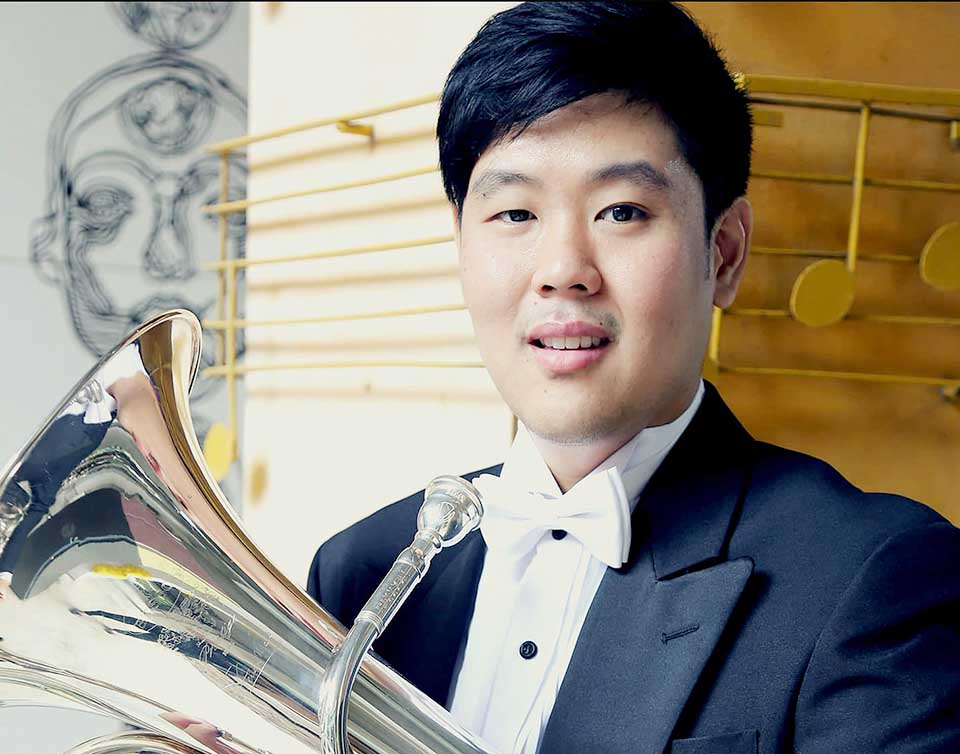
If your musical experiences have been restricted to chamber music, opera or orchestral music it is possible that you have never encountered a euphonium. The instrument rarely appears in classical music and has never had a permanent place in the symphony orchestra. Its traditional home is in the band and you’ll find at least one of them in every British brass band. It looks like a small tuba, and for a time it was even known as the tenor tuba. The instrument is somewhat similar in appearance to the baritone horn which is also seen in American wind bands.
No one is really certain who invented the euphonium. During the middle years of nineteenth century Europe, there was a flurry of wind instrument development, partly due to the invention of piston valves in the 1820s. Several instrument makers produced euphonium-like instruments (notably Adolphe Sax) and in 1843 Ferdinand Sommer of Weimar constructed an instrument which he called the “euphonion” the name of which derives from the Greek euphonos meaning “sweet-voiced”. Incidentally, Sommer also invented a similar instrument (long since extinct) which he modestly named the “Sommerophone” and played it, evidently to an appreciative audience at London’s Great Exhibition of 1852. It is likely that several prototype euphoniums existed around the same time but by the 1890s the instrument had become pretty well standardized. It found a willing home in the forty thousand British brass bands of the day.
Strangely enough, the euphonium never found a permanent place in jazz bands and rarely appeared in symphony orchestras. However, in more recent times, the instrument has become appreciated by orchestral composers for its remarkable agility and rich, sonorous tone colour. Several notable composers have composed concerti for the instrument.
Joseph Horovitz was born in Vienna into a Jewish family who emigrated to England in 1938. He later studied music and modern languages at New College, Oxford then moved to the Royal College of Music in London, studying composition with Gordon Jacob. He became a successful composer and conductor best known for his 1970 pop cantata Captain Noah and his Floating Zoo, which became hugely popular in British schools. He was a prolific composer of ballet music, orchestral music (including nine concertos), wind band and chamber music.
This 1972 euphonium concerto is probably the first major concerto for the instrument, and was written for a commission by the National Brass Band Festival. It’s an approachable work, easy on the ear and with many references to English folk songs. The beautifully lyrical melodic writing of the second movement is especially moving.
The Maribor Conservatory of Music and Ballet of Slovenia was established in 1945, and strives to develop and enhance music and dance education from preschool children to secondary school students. The young musicians give a fine account of the work and the euphonium soloist is superb. The burst of hesitant applause after the first movement reveals that even in Slovenia, people are unsure when to applaud during a concert.
The French-Romanian composer, conductor and violinist Vladimir Cosma was born into a family of musicians. His father was a pianist and conductor and his mother a writer-composer. After receiving first prizes for violin and composition at the Bucharest Conservatoire of Music, he arrived in Paris in 1963 and continued his studies at the Paris Conservatoire with the distinguished teacher Nadia Boulanger. As well as for classical music, he also had a passion for jazz, film music and all forms of popular music. He enjoys a brilliantly successful career in music and has composed more than three hundred scores for feature films and TV series as well as many works for the concert hall.
Cosma’s Euphonium Concerto is one of the most challenging and rewarding euphonium solos in the repertoire and a different kettle of fish from the Horowitz work yet equally enjoyable and rewarding. The player requires a virtuoso technique, because the technical challenges are formidable. The composer uses the extreme ranges of the instrument as well as tricky techniques like triple tonguing. The work has an unmistakable Spanish flavour and the reflective and haunting slow movement evokes memories of Astor Piazzolla, the famous composer of tangos. Our own Thailand Philharmonic are in fine form, conducted as usual by the incomparable Dariusz Mikulski. The Thai soloist Boonyarit Kittaweepitak graduated from the University of North Texas in 2020 with a Doctoral of Musical Arts degree and is currently a professor of euphonium at the College of Music, Mahidol University. He provides a stunning performance of this brilliant work.
 |
 |
 |





